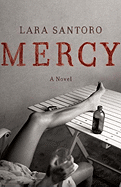
Lara Santoro would like to drag you into the heart of the African AIDS crisis, and she does so in her hilarious, harrowing new novel, Mercy.
 It's a passionate book, with intense characters who have intense feelings. No one whispers. Everyone shouts. The novel is noisy with arguments and vocal explosions, mostly because of the alcoholic narrator, Anna, a 29-year-old Italian news correspondent in Africa. Anna's got more handsome, interesting boyfriends than she knows what to do with, most of whom she betrays and treats terribly, and she isn't much easier on her long-suffering editor back in Rome. Of course, she is Italian, which explains some of the hot-headedness, but even this Italian reader became exhausted by all of her angry emotionalism.
It's a passionate book, with intense characters who have intense feelings. No one whispers. Everyone shouts. The novel is noisy with arguments and vocal explosions, mostly because of the alcoholic narrator, Anna, a 29-year-old Italian news correspondent in Africa. Anna's got more handsome, interesting boyfriends than she knows what to do with, most of whom she betrays and treats terribly, and she isn't much easier on her long-suffering editor back in Rome. Of course, she is Italian, which explains some of the hot-headedness, but even this Italian reader became exhausted by all of her angry emotionalism.But that's being picky. In spite of occasional excesses, the novel is vibrantly alive and two characters, in particular, are so moving and funny they practically burst out of the plot.
Father Anselmo would be worth the price of admission alone. He's a grizzled old priest who, to the horror of his religious order, leaves the monastery to live in the most wretched, violent slum of Nairobi. He's been there 12 years, tending to the sick, the dying, the poor. His eloquent prayers, outrageous philosophies and visionary comments on the blindness of evil, or the relationship between God and time, make you want to grab a pen and jot them down. He's a flinty old saint for our era, and delightfully comic--he doesn't realize the tea he serves, made with contaminated slum water, gives everyone who drinks it violent bowels.
But the book belongs to the title character, Mercy Achungo. She's a product of the slum, where she had become the most powerful dealer of the poor man's trash alcoholic drink, muratina. Now she's reformed. She's six-feet-tall, loud, feisty and authoritarian, and she dresses like a disco queen going clubbing. She's Anna's housegirl and soon takes control of the house. It takes Mercy to teach Anna how to act like "the big people of the world." Every scene she's in is a joy.
Author Santoro comes at you two-fisted, but you've gotta love her for it, because like Mercy's mission to demand affordable anti-retroviral drugs for the poor of Africa, Santoro and her larger-than-life character, Mercy, are in your face for the best of human reasons.
Santoro is a journalist who has covered every aspect of the AIDS crisis. She's seen hell, but she also knows the joy of African laughter, and her comprehensive portrait of a continent in crisis, her simmering anger and authority give this novel a bite and realistic vivacity that set it apart. You really owe it to yourself to meet Mercy.
As Mercy would say, "You! How are you making yourself useful?"--Nick DiMartino

